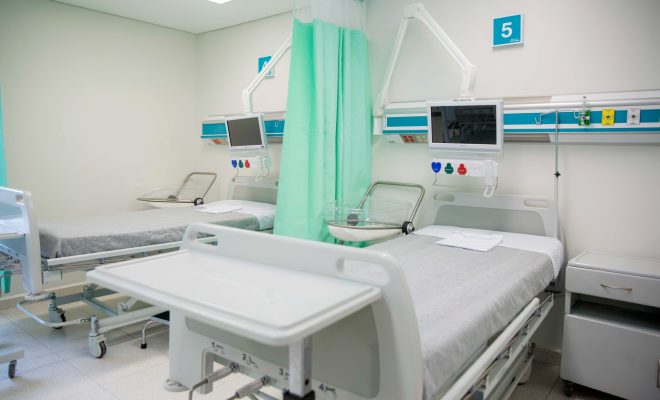
Image courtesy of [Presidencia de la República Mexicana via Flickr]
Law
Medical Treatment For Rape Victims: Who is Responsible?
Victims of rape often experience multiple hardships in the aftermath of their attack. Not only can they sustain serious physical injuries during an assault, but many also experience emotional trauma. Some may lose a job or home, or will need to relocate due to safety concerns. Each case is different, but there are many common issues experienced by rape victims, especially when it comes to medical problems.
It’s estimated that 19-22 percent of rape victims experience genital injuries. Sexually transmitted infections (STIs) are contracted by 40 percent of rape victims, while one to five percent become pregnant by their rapists. Thus, for rape victims, medical expenses can be quite costly.
Read on to learn more about federal regulations, state practices, and current issues in medical assistance for rape victims.
How does the federal government regulate medical assistance for rape victims?
Medical assistance for rape victims is addressed by the federal government through two distinct laws: VAWA and VOCA.
What is VAWA and how does it help rape victims?
VAWA is the Violence Against Women Act, first passed by the federal government in 1994. It’s a comprehensive law aimed at protecting women who were victims of violence, including rape. Among other things, VAWA mandates that rape victims cannot be forced to pay for their own rape examination or for services of protective order. Essentially, it outlines the minimum requirements and necessities victims of rape should be entitled to, but still gives states substantial freedom to create their own guidelines, especially when it comes to financial assistance.
Since the law was passed, it has gone through several revisions. First, VAWA was reauthorized in 2000, enhancing penalties for abusers, adding immigration protections, and creating programs for elderly and disabled women. In 2005, Congress reauthorized VAWA again, focusing on amending rules regarding states’ accountability and public health responses to domestic violence. This revision also advanced rape victims’ rights, by requiring states to cover the costs of the rape kit. In the case of noncompliance, states would lose certain federal crime fighting grants.
The 2013 reauthorization of VAWA clarified the issue of forensic examination even further, providing that in no circumstances can rape victims be charged upfront for their medical examination, and reiterating that such medical services should always be provided free of charge. At the same time, this last revision still allowed states to require victims to submit claims to their medical insurance company, but emphasizes that victims are not responsible for paying deductibles or co-payments for the services provided. The newly revised version of VAWA also pays more attention to public outreach, stating that every victim should be promptly informed about free-of-charge forensic examinations.
What are VOCA and the Crime Victim Compensation Program?
VOCA is the Victim of Crimes Act that was first passed by Congress in 1984. It created the Crime Victims Fund, which provides federal monetary assistance to states through the Victim Assistance Grant and Crime Victim Compensation Program (CVCP). The fund’s balance was estimated at more than $4 billion as of August 2010. As states receive federal funding they are supposed to use it to compensate crime victims. As of now, state compensation programs pay $500 million annually to more than 200,000 victims across the country.
Each state has its own Crime Victim Compensation Program (CVCP) that provides financial assistance for victims of crimes, including rape victims. Some state CVCPs were created even before VOCA came into affect. The first program was established in California in 1965. Federal grants cover 25-60 percent of the program’s costs. The rest of the money comes from local and state funds that are generated from criminal fines and penalties obtained through the court system. According to recent statistics, rape victims receive eight percent of all CVCP funds.
Typical programs provide help with medical bills, mental health treatments, funerals, and lost wages. As states decide what will be covered by their CVCP, the degree of financial assistance varies greatly. Some states may pay for travel costs to medical facilities, moving expenses, housekeeping, and even child care, while others will hardly cover medical bills. In addition, states may offer a variety of services, but provide different benefit amounts as well as have specific eligibility requirements.
What are the main issues in securing medical assistance for rape victims?
Variations in State Practices
Federal laws provide minimal guidelines to states about how to manage federal grants and what services to cover. This rift creates disparities, as each state has its own set of rules and regulations about medical assistance for rape victims. VAWA only mandates that states provide forensic medical examinations free of charge, but doesn’t mention non-forensic medical expenses. Thus, rape victims may end up paying for their medical treatment, including injuries sustained from rape, emergency contraception, and medications to prevent or treat HIV infections and other STIs. Some states cover these expenses, but are less likely to do so as there is no federal requirement to pay for these specific services.
For example, in Missouri, the victim compensation program won’t pay for treatment of injuries, medications, emergency contraception, STI testing, pregnancy testing, emergency room fees, or counseling. Essentially, it won’t cover any of the “collateral” costs of rape. It will only pay for the forensic examination as mandated by the federal law. At the same time, in Montana, rape victims are provided with free pregnancy testing, STI testing, medication, hospital or emergency room stays, and even drug testing. Only 15 states cover the costs of STI testing, 13 cover pregnancy testing, six pay for emergency contraception, and only two provide free-of-charge counseling in relation to sexual assault.
State Caps on Medical Services
Not only does each state have a distinct set of laws that regulate what medical services can be covered by its victim compensation program, but many states have caps on how much they will pay for those medical services. The range is quite broad, from $450 in Oklahoma to $25,000 in Rhode Island. Five states–Utah, Vermont, Louisiana, New Mexico, and Arkansas–will cover a set percentage of the medical bills ranging from 70-100 percent. Some states will compensate victims only for the forensic medical exam, the bare minimum required by the federal law. Even in this case, victims will have to pay for their rape kit first, and apply for compensation of their expenses later. Interestingly, in Montana, rape victims can be compensated only if the fund still has money. If the fund runs out of money, victims will be charged for all medical services received.
Lax Enforcement of Federal Laws
In some states victims of rape are still billed for their forensic examinations. Such exams are essential for collecting evidence such as semen, blood, and tissue samples. Without a proper medical exam after a rape, the ability to solve the crime and to convict the rapist greatly diminishes. In California, in order to be eligible for the free forensic examination, rape victims have to cooperate with the police in the ongoing investigation. In Texas, victims of rape are mandated to report the crime to authorities within a four-day period. If they fail to do so, their medical exam won’t be covered. Illinois covers such exams only for low-income or uninsured victims, while Maryland doesn’t explicitly prohibit billing the costs of a forensic exam to the victim. Thus, some states may find loopholes in federal regulations to bill victims for their forensic examinations.
The cost of a rape kit can be up to $1,200. Watch the video below to learn more about how victims of sexual crime are billed in Louisiana.
Hospital and Law Enforcement Mistakes
Hospitals and police stations are often the first points of contact for crime victims, including those who are the victim of rape. Hospitals administer forensic exams and provide other necessary medical treatments, and they are in charge of medical billing. As financial assistance for victims of rape is regulated by federal, state, and local rules, billing departments have to know how to navigate the system in order to bill correctly. They often mistakenly charge victims of sexual crime for forensic exams and other services due to improper paperwork or their lack of knowledge about the process. The medical file of a rape victim may not contain information on whether he or she was a victim of rape. At the same time, billing employees can be confused about the current laws, or not aware of the latest revisions. In most instances, after hospitals become aware of their billing mistake, they will make it right by billing CVCP or other organizations that should bear the costs of the rape kit.
The same confusion is taking place in police departments across the country. Some employees are still not aware about the latest VAWA revisions and still use outdated information, charging rape victims for their forensic exams.
How do these issues affect rape victims?
As medical assistance for rape victims varies greatly from state to state, some victims will have to foot some or most of the bill themselves. As a consequence, victims of rape can end up refusing medical treatment or skipping essential HIV or STI testing, harming their health.
At the same time, some victims may still be charged for their forensic examination, which is an essential part of the evidence collection process. If the victim is unsure about the costs of the exam, he or she can be reluctant to report the crime or undergo the procedure in the first place. As rape cases are already hard to prove, it can become almost impossible to obtain justice without the rape kit.
Billing rape victims for medical services, either by mistake or according to variations in state laws, can also harm a victim’s personal life. In many cases, victims of rape don’t want their family members to know about the victimization. If the parents of the victim hold the insurance policy, it can lead to shaming or family issues, or in some cases re-victimization, if the attacker is a family member.
Conclusion
Victims of rape receive financial assistance from a variety of sources including federal, state, and local funds. In addition, their insurance policies, if they have one, can cover some of the expenses. The federal government acknowledged in its latest revision of VAWA that victims should never pay for their forensic examination, as it’s a part of the evidence-collection process. At the same time, it’s not clear who should be paying for the “collateral costs” such as HIV, STI, and pregnancy testing as well as the treatment of physical injuries.
Resources
Primary
Congress: Violence Against Women Reauthorization Act of 2013
White House: Factsheet: The Violence Against Women Act
Additional
National Center For Victims of Crime: Crime Victims Compensation
National Association of Crime Victim Compensation Boards: Crime Victim Compensation: An Overview
ProPublica: Despite Promises, Some Rape Victims Stuck Paying Exam Bills
NPR: Despite Law, Rape Victims Sometimes Pay For Medical Services
New York City Alliance Against Sexual Assault: The Cost of Rape
CBS Evening News: For Some Sex Assault Victims, Ordeal Carries Price Tag
Huffington Post: Worst States For Pregnant Rape Victims
Frisky: Some Rape Victims Are Forced to Pay For Their Medical Treatment
Huffington Post: Rape Victim’s Choice: Risk AIDS or Health Insurance?
NOLA: Billing for Rape: Louisiana Sex Assault Victims Often Face Hefty Bills for Medical Care
AEquitas: Summary of Laws & Guidelines. Payment of Sexual Assault Forensic Examinations
Human Rights Watch: Making Rape Victims Pay
ProPublica: As Rape Victims Wait, Money For DNA Testing Goes Unused








Comments